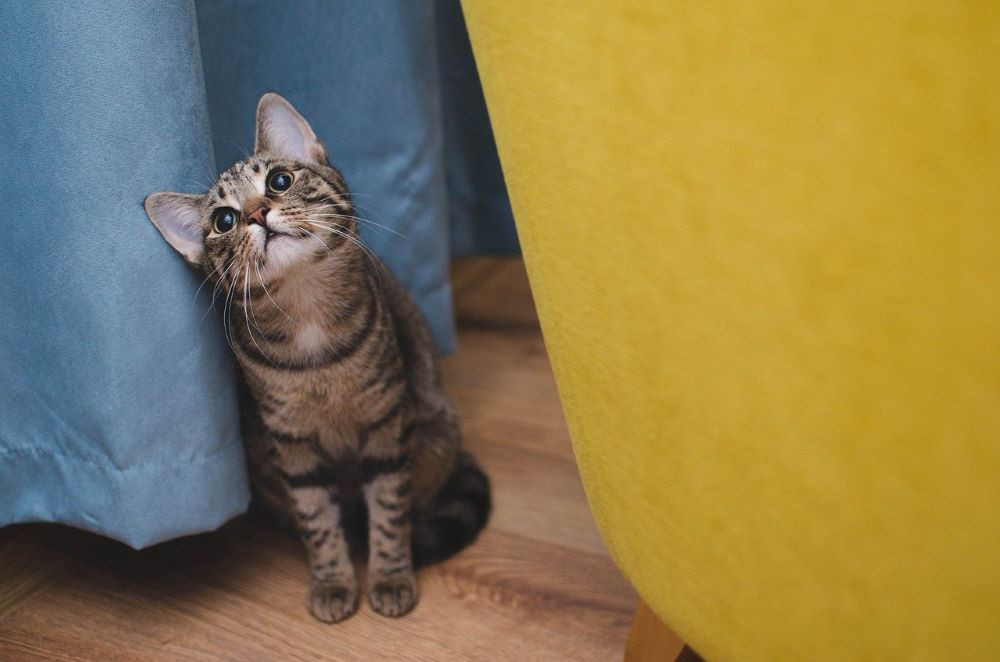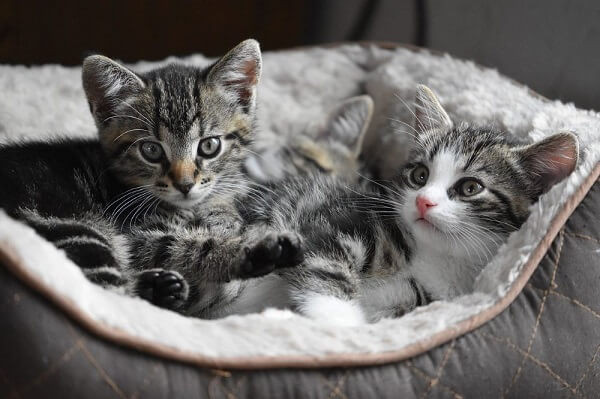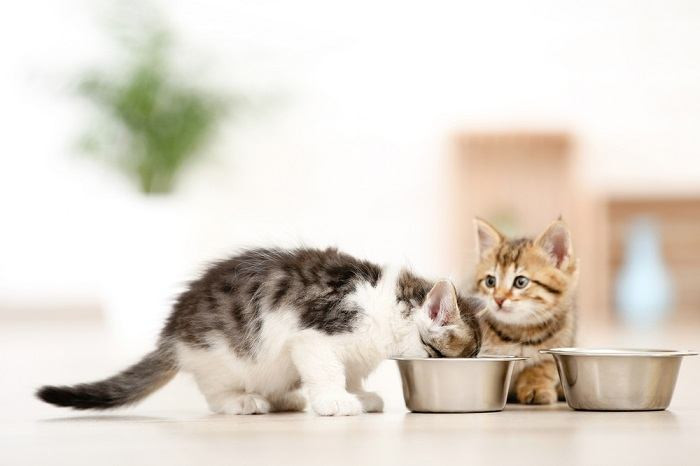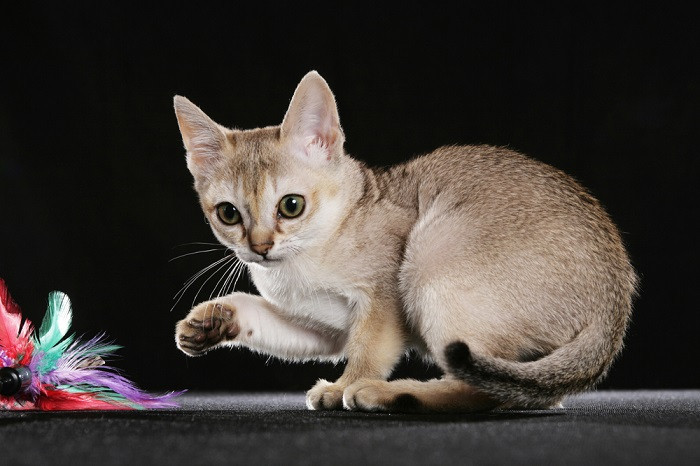 Curious kitten looking up, questioning whether it can eat adult cat food
Curious kitten looking up, questioning whether it can eat adult cat food
Bringing a new kitten into your home is an exciting time. These tiny furballs are full of energy, curiosity, and an undeniable amount of cuteness. As a responsible pet owner, ensuring their health and well-being is paramount, and a significant part of that is providing the right nutrition. With so many cat food options available, you might wonder if it’s okay to feed your kitten adult cat food. The short answer is no, kittens should not eat adult cat food. This article will delve into the reasons why kittens have distinct dietary needs and why feeding them adult food can be detrimental to their growth and development.
Kitten’s Unique Nutritional Needs: Fueling Rapid Growth
 A tiny kitten curled up comfortably in a soft bed, highlighting the vulnerability and need for care during the kitten life stage
A tiny kitten curled up comfortably in a soft bed, highlighting the vulnerability and need for care during the kitten life stage
Kittens are not just small cats; they are in a crucial phase of rapid growth and development. Think of kittenhood as a period of intense building – bones are forming, muscles are developing, and their immune system is maturing. This incredible growth spurt demands a very specific balance of nutrients, far different from the needs of a fully grown, adult cat.
Rapid Growth Phase: A Time of Intense Development
From birth to about 12 months of age, kittens undergo an astonishing transformation. In their first year, they can increase their body weight up to 50 times! This rapid growth requires a significantly higher intake of calories, protein, and essential minerals compared to adult cats who are simply maintaining their bodies. Imagine building a house – you need significantly more materials during construction than for routine maintenance after it’s built. Kittens are in the construction phase, and their diet needs to reflect that.
Higher Energy Requirements: Fueling Activity and Growth
Kittens are bundles of energy, constantly playing, exploring, and learning about their world. This high level of activity, combined with their rapid growth, means they need more calories per pound of body weight than adult cats. Kitten food is specifically formulated to be calorie-dense, providing the energy they need to thrive during this active and developmental stage. Adult cat food, designed for less active, fully grown cats, simply doesn’t pack the same energy punch.
Protein is Crucial for Development: Building Blocks for a Healthy Body
Protein is the fundamental building block for all tissues in the body, including muscles, skin, fur, and organs. For growing kittens, protein is even more critical. They need a higher percentage of protein in their diet to support muscle development, tissue repair, and the production of essential enzymes and hormones. Kitten food formulations are rich in high-quality, animal-based protein sources to meet these elevated needs. Adult cat food, while containing protein, typically has a lower percentage, formulated for maintenance rather than growth.
Essential Minerals: Calcium and Phosphorus for Strong Bones
Just like protein, certain minerals are required in higher amounts during kittenhood to support skeletal development. Calcium and phosphorus are essential for building strong bones and teeth. Kitten food is carefully balanced with the correct ratio of these minerals to ensure healthy bone growth. Adult cat food has a different mineral balance, appropriate for maintaining bone health in mature cats but insufficient for the rapid bone development in kittens. An imbalance of calcium and phosphorus during kittenhood can lead to serious skeletal problems later in life.
Why Adult Cat Food is Not Suitable for Kittens: Nutritional Deficiencies
 Two kittens eagerly eating kitten food from a bowl, emphasizing the importance of proper kitten nutrition
Two kittens eagerly eating kitten food from a bowl, emphasizing the importance of proper kitten nutrition
Feeding kittens adult cat food might seem convenient, especially if you already have an adult cat in the household. However, doing so can lead to significant nutritional deficiencies and health problems for your growing kitten. Adult cat food is simply not formulated to meet the unique demands of a kitten’s developing body.
Lower Protein Content in Adult Food: Hindering Muscle Growth
As mentioned earlier, kittens require a higher percentage of protein in their diet compared to adult cats. Adult cat food is formulated with lower protein levels, sufficient for maintaining muscle mass in a mature cat but inadequate for supporting the rapid muscle growth in kittens. Feeding adult food can lead to protein deficiencies, hindering muscle development and overall growth.
Insufficient Fat and Calories: Lack of Energy for Growth and Activity
Kittens need more calories and fat than adult cats to fuel their high energy levels and rapid growth. Adult cat food typically has lower fat and calorie content, designed for less active, adult cats who are prone to weight gain. Feeding kittens adult cat food can result in insufficient energy intake, potentially leading to stunted growth, lethargy, and a weakened immune system.
Imbalance of Calcium and Phosphorus: Risking Skeletal Problems
The carefully balanced ratio of calcium and phosphorus in kitten food is crucial for healthy bone development. Adult cat food has a different mineral balance, appropriate for adult cats but potentially detrimental to kittens. Feeding adult food can disrupt the delicate mineral balance needed for kitten bone growth, increasing the risk of skeletal deformities and other bone-related issues later in life.
Potential Health Problems from Feeding Kittens Adult Cat Food: Long-Term Consequences
Consistently feeding kittens adult cat food can have serious long-term health consequences due to the nutritional deficiencies it creates. These problems can range from stunted growth to severe skeletal issues and other health complications.
Stunted Growth and Development: Failure to Reach Full Potential
The most immediate and visible consequence of feeding kittens adult cat food is often stunted growth. Without adequate protein, calories, and essential nutrients, kittens may not reach their full growth potential. They may be smaller and less developed than kittens fed a proper kitten diet. This can impact their overall health and well-being throughout their lives.
Weak Bones and Skeletal Issues: Long-Term Mobility Problems
The imbalance of calcium and phosphorus in adult cat food poses a significant risk to a kitten’s developing skeletal system. Insufficient or improperly balanced minerals can lead to weak bones, increasing the risk of fractures and deformities. These skeletal problems can cause pain, mobility issues, and a reduced quality of life for the cat as they age.
Nutritional Deficiencies and Health Complications: Compromised Immune System
Beyond protein, fat, and minerals, kittens also require specific levels of other essential nutrients, such as certain vitamins and fatty acids like DHA and EPA for brain and retinal development. Adult cat food may not provide adequate levels of these crucial nutrients for kittens. Nutritional deficiencies can weaken the immune system, making kittens more susceptible to infections and illnesses. Long-term deficiencies can also contribute to a range of health problems, affecting organ function and overall vitality.
When Can Kittens Transition to Adult Cat Food? Timing is Key
 A Singapura cat playfully batting at a toy, representing the active and energetic nature of kittens as they grow
A Singapura cat playfully batting at a toy, representing the active and energetic nature of kittens as they grow
Knowing when to switch your kitten from kitten food to adult cat food is crucial for their continued health. The general recommendation is to transition to adult cat food when your kitten reaches approximately 12 months of age. At this point, their rapid growth phase is largely complete, and their nutritional needs shift to maintenance rather than growth.
However, it’s important to consider individual differences. Some breeds may mature slightly earlier or later. Consulting with your veterinarian is always recommended to determine the best time to switch your kitten to adult food based on their individual growth and development. Your vet can assess your kitten’s condition and provide personalized advice on dietary transitions.
Choosing the Right Kitten Food: Prioritizing Quality
Selecting the right kitten food is essential for providing your furry friend with the best start in life. Here are some key factors to consider when choosing a kitten food:
Look for “Kitten Food” Label: Specifically Formulated for Growth
Always choose food specifically labeled as “kitten food” or “kitten formula.” These formulas are designed to meet the elevated nutritional needs of growing kittens. Avoid foods labeled “for all life stages” unless you have confirmed with your veterinarian that it meets the specific requirements for kitten growth.
Check AAFCO/FEDIAF Statement: Ensuring Nutritional Adequacy
Look for a statement from the Association of American Feed Control Officials (AAFCO) or the European Pet Food Industry Federation (FEDIAF) on the food label. This statement guarantees that the food provides “complete and balanced nutrition for kittens” based on established nutritional standards. This is a crucial indicator of quality and nutritional adequacy.
High-Quality Ingredients: Easily Digestible and Nutrient-Rich
Opt for kitten foods made with high-quality, easily digestible ingredients. Animal-based protein sources like chicken, fish, or lamb should be prominent on the ingredient list. Avoid foods that rely heavily on plant-based proteins or fillers. High-quality ingredients ensure optimal nutrient absorption and support healthy growth and digestion.
Feeding Guidelines for Kittens: Providing the Right Amount
Feeding kittens appropriately involves not only choosing the right food but also feeding them the correct amount at the right frequency. Kittens have small stomachs and need to eat more frequently than adult cats.
- Frequency: Young kittens (from weaning to 6 months) typically need to eat 3-4 meals per day. As they approach adulthood (6-12 months), you can gradually reduce feeding frequency to 2-3 meals per day.
- Portion Sizes: Follow the feeding guidelines provided on the kitten food packaging. These guidelines are usually based on the kitten’s weight and age. However, these are just starting points, and you may need to adjust portion sizes based on your kitten’s individual appetite and body condition.
- Fresh Water: Always ensure your kitten has access to fresh, clean water at all times. Water is the most essential nutrient for cats of all ages and is particularly important for kittens to prevent dehydration and support overall health.
Conclusion: Prioritize Kitten Food for Healthy Growth
In conclusion, kittens absolutely should not eat adult cat food. Their nutritional needs are significantly different from adult cats due to their rapid growth and development. Feeding kittens adult cat food can lead to serious nutritional deficiencies, stunted growth, skeletal problems, and other health complications.
Providing your kitten with a high-quality, specifically formulated kitten food is an investment in their long-term health and well-being. By meeting their unique nutritional needs during this crucial stage of life, you are setting them up for a healthy, happy, and active future. Always consult with your veterinarian for personalized advice on your kitten’s diet and nutritional requirements.
Frequently Asked Questions
When can kittens eat adult cat food?
Kittens should transition to adult cat food around 12 months of age, or as advised by your veterinarian, once their rapid growth phase is complete.
Can kittens eat adult wet food?
No, kittens should not eat adult wet food. While wet food can be beneficial for hydration, adult wet food formulations still lack the necessary nutrients and proportions required for kitten growth and development. Always choose wet food specifically formulated for kittens.

